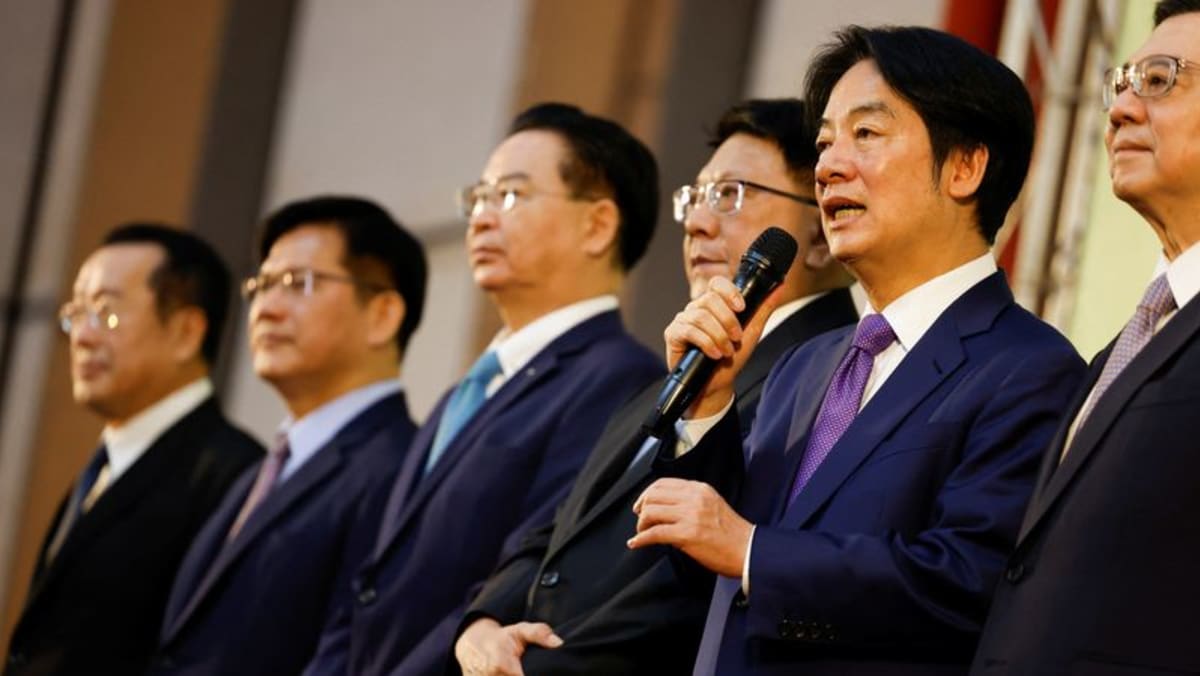
SINGAPORE: Five days before Mr William Lai Ching-te’s inauguration as Taiwan’s president, its defence ministry detected 45 Chinese military aircraft around Taiwan, the highest single-day number this year. Twenty-six of the planes on Wednesday crossed the median line of the Taiwan Strait, which once served as an unofficial barrier between the two sides.
In a friendlier gesture, when lawmakers from Taiwan’s China-friendly opposition party Kuomintang (KMT) visited the mainland last month, China said it would restart the travel of Fujian residents to Taiwan’s Matsu islands and later allow group tours to other parts of the territory.
China also said it would approve the import of pomelo and other agricultural and fishery products from Taiwan.
Such a “carrot and stick” approach is likely to continue and intensify as China’s preferred way of dealing with Taiwan under Mr Lai, who takes over from Ms Tsai Ing-wen on May 20, say observers, as Taipei becomes more important to Beijing’s calculations amid a tussle for influence with the West and economic challenges at home.
Mr Lai won a historic third successive presidential term for the independence-leaning Democratic Progressive Party (DPP) in January’s elections, beating the KMT’s Mr Hou Yu-ih and Mr Ko Wen-je of the Taiwan People’s Party (TPP).
Beijing’s message to Mr Lai is clear, observers say: Taiwan will reap benefits if it plays ball in forging deeper cross-strait integration but face reprisal should it try pushing further away from China, which sees the self-governing island as part of its territory to be reunified with the mainland.
Amid growing pressure from China, analysts say Taiwan will look increasingly towards other states for economic and diplomatic mileage as Mr Lai attempts to maintain the cross-strait status quo of not declaring independence.
But there are limits on what Taipei can do, with the lack of a legislative majority potentially stonewalling efforts. There are also clear constraints on how far Mr Lai can expand or deepen Ms Tsai’s New Southbound Policy of closer economic and people-to-people links with South and Southeast Asian countries, as well as Australia and New Zealand.
“China is basically the primary economic lifeline for all the countries in the region,” Dr Hoo Tiang Boon, associate professor at the School of Social Sciences at Singapore’s Nanyang Technological University (NTU), told CNA.
“(Southeast Asian nations) will be very cautious to be seen as forging closer linkages with Taiwan … they have to be very mindful of and indeed sensitive to Chinese considerations.”
“CARROT AND STICK” APPROACH
Cross-strait relations have ebbed and flowed depending on the person and party that governs Taiwan.
Ties were strained from 2000 to 2008 when the DPP’s Chen Shui-bian was president. They improved considerably under his KMT successor Mr Ma Ying-jeou – including a landmark meeting in 2015 with Chinese President Xi Jinping – before deteriorating again when the DPP’s Tsai Ing-wen took office in 2016.
Troubles surfaced during her inaugural speech, which Beijing criticised as an “incomplete test answer” for not explicitly recognising the 1992 consensus.
https://news.google.com/rss/articles/CBMie2h0dHBzOi8vd3d3LmNoYW5uZWxuZXdzYXNpYS5jb20vZWFzdC1hc2lhL3RhaXdhbi1wcmVzaWRlbnQtd2lsbGlhbS1sYWktaW5hdWd1cmF0aW9uLWNoaW5hLWFzZWFuLXNvdXRoZWFzdC1hc2lhLXRpZXMtNDM0MTE1MdIBAA?oc=5
2024-05-17 22:00:00Z
CBMie2h0dHBzOi8vd3d3LmNoYW5uZWxuZXdzYXNpYS5jb20vZWFzdC1hc2lhL3RhaXdhbi1wcmVzaWRlbnQtd2lsbGlhbS1sYWktaW5hdWd1cmF0aW9uLWNoaW5hLWFzZWFuLXNvdXRoZWFzdC1hc2lhLXRpZXMtNDM0MTE1MdIBAA
Tidak ada komentar:
Posting Komentar